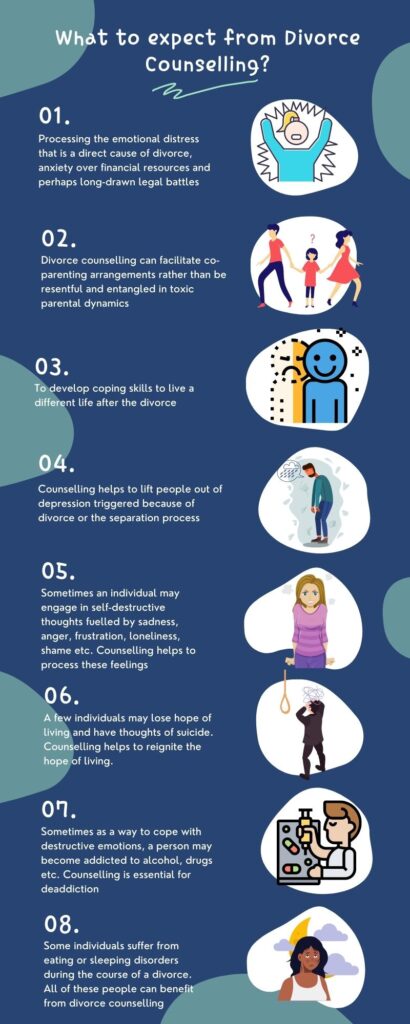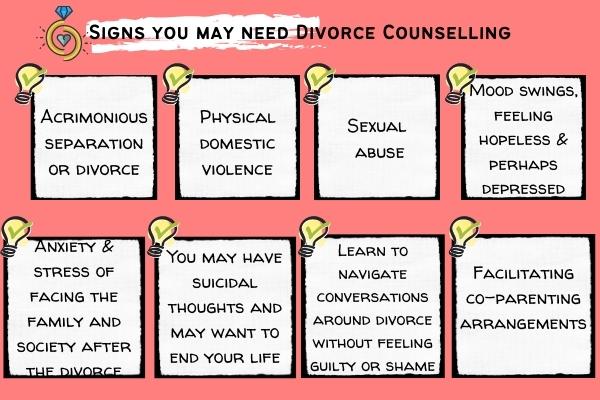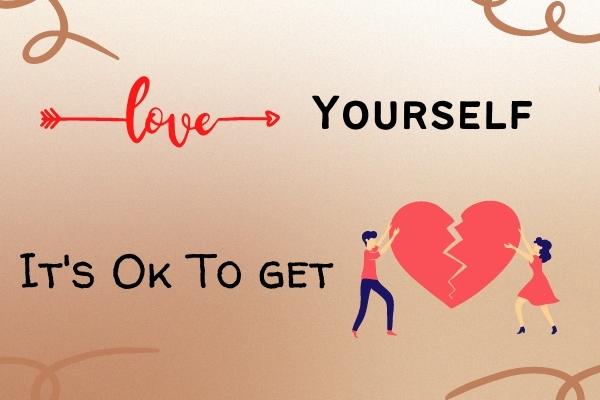“Just because a relationship ends, it doesn’t mean it’s not worth having.” – Sarah Mlynows
To save a marriage, people often think of going to marriage or couple counselling. When divorcing, or separating or if you are confused about your decision to divorce, you might also be interested in divorce counselling.
Divorce can be emotionally tumultuous, and you may need support to get through the painful process. Does divorce counselling really help…..
What Is Divorce Counselling?
Divorce counselling is helpful for processing, grieving and supporting people who are looking to journey forward in their lives.
A divorce counsellor offers services to
- couples about to divorce or
- who are going through the aftermath of a divorce.
- Or individuals who are contemplating divorce
The legal process of divorce affects not just the separated couple but also other members of their family. In many parts of the world, divorce is quite common.
The United States and the United Kingdom has a 50% rate of all marriages ending in divorce, with a significant number of people divorcing within the first five years of marriage. Singapore also has a high number of marriage dissolutions. In 2020 for 22,651 marriage solemnisation, there were 6,959 dissolutions.
Divorce though common, is a cause of stress and anxiety due to emotional, mental, financial, and legal factors the couple must consider and because their lives change dramatically once they decide to proceed with a divorce.
Divorce counselling also helps individuals in minimising the impact of divorce on their children and other family members. They also learn to heal from their emotional and psychological baggage or trauma as a result of divorce.
Counselling for divorce aims to assist individuals in adjusting to their new lives and dealing with the negative consequences of separation.
It is not necessary for all couples going through a divorce to seek divorce counselling. However, most benefit from being on a faster road to recovery from their emotional turmoil.
What To Expect from Divorce Counselling?
Divorce inevitably may trigger heightened anxiety, insecurities, resentment, sadness, and grieving but at the same time may also bring in the sense of relief.
Divorce or separation is not an easy decision, and it may involve a high degree of hurt, pain, confusion, anger and anxiety.
In Asian culture, many view divorce as a sign of failure. However, plenty of people staying in a marriage may be miserable, and divorce may lead them to new journeys in their lives.
Divorce Counselling helps a person to:
- Processing the emotional distress that is a direct cause of divorce, anxiety over financial resources and perhaps long-drawn legal battles.
- Divorce counselling can facilitate co-parenting arrangements rather than be resentful and entangled in toxic parental dynamics.
- To develop coping skills to live a different life after the divorce.
- Counselling helps to lift people out of depression triggered because of divorce or the separation process.
- Sometimes an individual may engage in self-destructive thoughts fuelled by sadness, anger, frustration, loneliness, shame, embarrassment etc. Counselling helps to process these feelings.
- A few individuals may lose hope of living and have thoughts of suicide. Counselling helps to reignite the hope of living.
- Sometimes as a way to cope with destructive emotions, a person may become addicted to alcohol, drugs etc. Counselling is essential for deaddiction.
- Some individuals suffer from eating or sleeping disorders during the course of a divorce. All of these people can benefit from divorce counselling.
Signs You May Need Divorce Counselling.
For many, divorce or separation can be a difficult emotional period. Like I have mentioned, not everyone opts for divorce counselling. However, there are a few things that indicate divorce counselling may benefit you.
- Acrimonious separation or divorce
- Physical domestic violence
- Sexual abuse
- Frequent verbal and emotional arguments that drain you of your energy
- Mood swings, feeling hopeless and perhaps depressed.
- You may have suicidal thoughts and may want to end your life.
- The counsellor may facilitate agreements when there are constant arguments about issues related to kids or finances during separation and divorce.
- Anxiety and stress of facing the family and society after the divorce
- Facilitating co-parenting arrangements
- Learn to navigate conversations around divorce without feeling guilty or shame
- Many times your ex-spouse may put all the blame for the divorce on you. Counselling will benefit you from processing the issues in marriage and letting go of your guilt.
- Having a spouse with mental illness can lead to your own emotional rollercoaster that needs healing.
I have mentioned a few reasons for seeking counselling or family therapy. However, the list above is not exhaustive. Each person goes through their own hurts and pain during the difficult time of separation and divorce. If you need a non-judgmental, safe and empathic environment to open and unload any excess emotional baggage that you may be carrying, remember you are not alone. At Insightful, our counsellors provide you with the listening ear in a safe and non-judgemental environment. They journey with you towards your healing.
Love Yourself – It’s Ok To Get Divorced.
Change is the most challenging path to take. Many times you are stuck in a marriage even though you are not happy. It may be that your children need both parents, or how will you manage financially or that you really love your spouse even though they do not reciprocate, or there may be a lack of intimacy or infidelity.
Please remember that your identity, self-confidence, and self-worth are not about your relationship with your spouse only. It’s also about your relationship with yourself. It may be time to start a new beginning – a loving relationship with your own self. It takes courage, and it may take many small steps, but a new beautiful world may be awaiting you.
Make A Fresh Start After Your Divorce.
A person may be hurt, shattered, ashamed, lost and confused about their future after the divorce. Many times after years of being together, it can be the ‘death’ of a relationship.
A fear about separation or divorce is the idea of starting your life on a new note. At Insightful, our counsellors walk through this journey with you as you begin anew. We help you work through your grief and loss – Divorce can be a huge loss and is usually accompanied by feelings of betrayal and deep trauma. Our counsellors help you process your emotions, including anger, shame, blame, sadness, frustration and more, recognise and communicate your needs, and learn to establish healthy boundaries with your ex-spouse.
Our counsellors help you seek out your issues, like how you can be there for your children as a single parent. Helping you cope with your parenting skills, and if needed helping your children cope with their emotional turmoil. We work with you to help you rebuild your life. We provide therapy both online as well as in-person counselling in our clinic located in Singapore.













